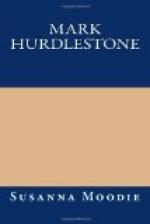“Can you promise me this?”
“I swear it. I will sell the reversion of the legacy left me by my aunt Maitland, which falls due at her husband’s death. It is eight hundred pounds; I will sell it for half its value to meet the demand. But to accomplish this, more time is required than I can just now command. Will this satisfy you?”
“It will. But woe to us both if you deceive me!”
“Can you imagine me such an ungrateful scoundrel?”
“You have betrayed me once before. If you fail this time, Godfrey, you will not die alone.”
Anthony went to the desk, and unlocked it with a trembling hand. As he opened the drawer which contained the money, a sudden chill crept through his veins, and he paused, irresolute how to act. “It is not theft,” he argued to himself; “it is but a loan, which will soon be repaid. A few hours cannot make much difference. Long before Frederic requires the money, it will be replaced.”
He had gone too far to recede. Godfrey was already at his side and eagerly seized the golden prize. With tears of real or feigned gratitude he left the house, and Anthony had leisure to reflect upon what he had done.
The more he pondered over the rash act, the more imprudent and criminal it appeared; and when, by the next post, he received a letter from Frederic, informing him that he had made a very advantageous purchase of land, and requested him to transmit the money he had left in his keeping, his misery was complete.
“Unfortunate Anthony!” he cried. “Into what new dangers will your unhappy destiny hurry you!”
Snatching up his hat, he rushed forth in quest of his unprincipled relative.
CHAPTER XVIII.
Strange voices still are ringing
in mine ears,
Something of shame, of anguish,
and reproach;
My brain is dark, I have forgot
it all.—S.M.
In the miserable attic over the kitchen in the public-house already described, there was a sound of deep, half-suppressed, passionate weeping—a young mother weeping for her first-born, who would not be pacified. The deepest fountain of love in the human heart had been stirred; its hallowed sources abused, and violently broken up; and the shock had been too great for the injured possessor to bear patiently. Her very reason had yielded to the blow, and she lamented her loss, as a forward child laments the loss of some favorite plaything. Had she not been a creature of passionate impulses, the death of this babe of shame would have brought a stern joy to her bereaved mind. She would have wept—for nature speaks from the heart in tears; but she would have blessed God that He had removed the innocent cause of her distress from being a partaker of her guilt, a sharer of her infamy, a lasting source of regret and sorrow.
Mary Mathews had looked forward with intense desire for the birth of this child. It would be something for her to love and cling to—something for whose sake she would be content to live—for whom she could work and toil; who would meet her with smiles, and feel its dependence upon her exertions. She thought, too, that Godfrey would love her once more, for his infant’s sake. Rash girl! She had yet to learn that the love of man never returns to the forsaken object of his selfish gratification.




